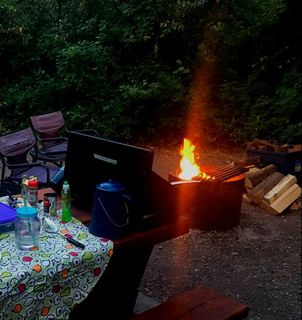 It’s summer, and with summer comes my hardwired need to go camping. For me it seems required, but it’s hard to convince a non-camper of the virtues of camping. It’s easy to see why. You’re opting to sleep on the ground over sleeping in the perfectly good bed that you already have. There are bugs, and there is dirt. If you head back-country camping, as my family did when I was young, you have no electricity, no electronics, and often no source of water that you don’t sterilize yourself. How is this a holiday? I whined about enough camping trips as a teenager to understand this view; now, my instinct is simply to counter that it is a holiday because of all these things, not in spite of them. You have dirt under your nails, you’ve been wearing the same t-shirt for three days, and your hair is raked back into sunscreen smeared braids – and nobody cares. Instead of electronics, you amuse yourself by watching seeds from a cotton tree waft upwards in the heat of a campfire. Camping is amazing and liberating and relaxing, even when you’re working. It connects you with a world that is alive and vitally important. It’s a privilege to be able to do it. The problem is, for many people, these arguments are weak. This is where this post becomes less about camping, and more about writing. Because with camping as with writing, it isn’t the big things that make it meaningful – it’s the little things. I tell my students, when they are writing, that specific is better than general. In arguing in favour of what I can’t explain, I’m going to follow my own advice, and give specifics. I love the practicalities of camping. I love campfires: everything about them. I love the smell, the sound, and the light, and I love the memory of shooting water pistols against the side of their iron grates when I was little, just to hear them sizzle. I love making the best possible eggs that I can on a two-burner propane stove (fried in bacon grease, of course). I love dusk in a campsite, when it isn’t quite dark, and you push your night vision a little longer so you won’t have to turn a lantern on. Not quite yet. The outdoors has educated me my whole life. My family hiked into the alpine of Black Tusk when I was five; in the morning, I was confused as to why there was heavy frost on the ground in August, and got my first lesson on how elevation affects temperature. It shows me animals and plants up close – sometimes heart-stoppingly close, like the time we went canoeing in the Bowron Lakes, and came through the rushes to see a massive mother moose and her calf. It lets me share what it has taught me with my students when I take them camping, like the fact that if you stroke a slug, you can pick up sticks by touching them with its slime. It’s small moments and shared memories that make this strange activity wonderful. As with any story, the meaning is in the details, and the details are virtually endless. I invite you to add your own below. Happy camping.
1 Comment
SUSAN JONES
7/18/2017 07:41:26 pm
Yes, Stories are important. Not just camping ones but all our stories. Thank you again for your beautiful writing. It flows and is a pleasure to read. I hope you have some good books along. Camping and reading just seem to go together. :)
Reply
Leave a Reply. |
Author
Jane Perrella. Teacher, writer. Expert knitter. Enthusiast of medieval swordplay, tea, Shakespeare, and Batman. Archives
June 2019
Categories |
 RSS Feed
RSS Feed
